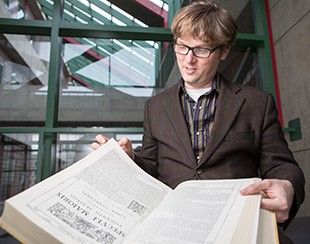From Beowulf to Gandalf: a new approach to Old English
In an era of Twitter and text messaging, Old English can be a tough sell. But Stephen Yeager, an assistant professor in Concordia’s Department of English, is using an unlikely angle to turn students on to 5th-to-12th-century Anglo-Saxon: the works of Lord of the Rings author J.R.R. Tolkien.
“Tolkien’s writing is very influenced by Old English,” says Yeager. His new online course will introduce students to the language by examining specific passages in The Hobbit, the Lord of the Rings trilogy and other Tolkien works that were clearly inspired by classic texts.
Yeager cites Beowulf as an example. “A translation exercise will use the passage that describes the theft of the dragon’s cup in Beowulf,” he says. “Then the literary discussion will involve comparing it to the same event in The Hobbit. How did Tolkien change it? How is his inspiration working?”
The course was one of the first proposals submitted to Concordia’s Curriculum Innovation Fund, an initiative that supports faculty members as they explore ways to improve classes and teaching methods. A joint effort of the Office of the Provost and the School of Graduate Studies, the fund upholds the university's Academic Plan commitment to providing students with dynamic programs and engaging learning experiences.
 Stephen Yeager’s course uses the “Tolkien angle” to interest students in Old English. | Photo by Concordia University
Stephen Yeager’s course uses the “Tolkien angle” to interest students in Old English. | Photo by Concordia University
“The melding of different spheres in Professor Yeager’s proposal is fascinating” says Catherine Bolton, vice-provost of Teaching and Learning. “He’s teaching fundamental skills, but he wants to do it in in an online format that's going to be interesting to students.”
Yeager believes that relating Old English to Tolkien favourites will soften its edges for students.
“I'm hoping that the Tolkien angle will encourage them to study the language, because it's really cool, really fun and really interesting. And it will help them understand Tolkien a lot better.”
He plans to test a hybrid online-classroom version of the course next year, followed by a fully online course in the 2015-16 academic year.
“The in-person version of the class is essentially a dry run,” he says. “I’ll be able to test the architecture for the online version, talking to the students regularly to find out what’s working and what’s not.”
For Yeager, the course’s biggest benefit is that it allows students to translate Old English texts collectively. “Small groups would meet online and create translations together, which they would then compare to the translations of their classmates,” he says.
This dynamic will be integral to its success. “That’s where the real learning happens — when you and your classmate end up with something different and you're trying to figure out who's right, rather than simply reading it aloud in class and having the teacher correct it before you realize why you were even wrong.”
The Curriculum Innovation Fund has two tracks: course transformation and program transformation. Successful applicants receive a maximum of $10,000 from the total envelope of $175,000. The next application deadline is Monday, March 17, 2014.
Learn more about the Curriculum Innovation Fund.
